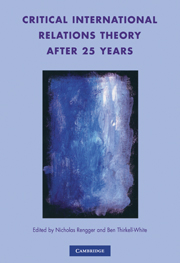Book contents
- Frontmatter
- Contents
- Preface
- Notes on contributors
- Editors' Introduction
- Looking back from somewhere: reflections on what remains ‘critical’ in critical theory
- Transnational theories of order and change: heterodoxy in International Relations scholarship
- Happy Anniversary! Time and critique in International Relations theory
- Is critical theory always for the White West and for Western imperialism? Beyond Westphilian towards a post-racist critical IR
- The promise of critical IR, partially kept
- Towards a sociology of global morals with an ‘emancipatory intent’
- Between Kant and Pufendorf: humanitarian intervention, statist anti-cosmopolitanism and critical international theory
- Index
Transnational theories of order and change: heterodoxy in International Relations scholarship
Published online by Cambridge University Press: 06 July 2010
- Frontmatter
- Contents
- Preface
- Notes on contributors
- Editors' Introduction
- Looking back from somewhere: reflections on what remains ‘critical’ in critical theory
- Transnational theories of order and change: heterodoxy in International Relations scholarship
- Happy Anniversary! Time and critique in International Relations theory
- Is critical theory always for the White West and for Western imperialism? Beyond Westphilian towards a post-racist critical IR
- The promise of critical IR, partially kept
- Towards a sociology of global morals with an ‘emancipatory intent’
- Between Kant and Pufendorf: humanitarian intervention, statist anti-cosmopolitanism and critical international theory
- Index
Summary
Abstract. In this article I argue that the very meaning of ‘inter-national relations’ is emerging as a focus of debate in International Relations, particularly among the critical traditions in the discipline. No longer seen as a mere study of peace and war, IR is viewed as a component of general pan-disciplinary theories or order and change. The international sphere is perceived, accordingly, no longer as a system in its own right, but rather as a gigantic transmission belt, and a huge communication device transmitting and diffusing ideas, practices, rules, norms and institutions throughout the world. The article examines the implications of such an approach on IR theory. In addition, the article revisits the works of Hegel, Marx and the French School of Regulation to demonstrate how they developed an empirical theory of international diffusion.
This special issue of the Review of International Studies aims to evaluate the impact and likely future direction of the so-called critical tradition in International Relations scholarship. But what precisely is this critical tradition? Is there one tradition, or a variety of traditions? Is it not the case that all theories and approaches are supposed to be critical? And who exactly has the right to proclaim themselves ‘critical’, and in doing so, by default pronounce their intellectual opponents uncritical?
For Robert Cox the critical tradition represents a certain sensibility, a historical awareness of the limitations and content of theory itself–an awareness that is presumably lacking in IR ‘orthodoxy’.
- Type
- Chapter
- Information
- Critical International Relations Theory after 25 Years , pp. 47 - 70Publisher: Cambridge University PressPrint publication year: 2007

